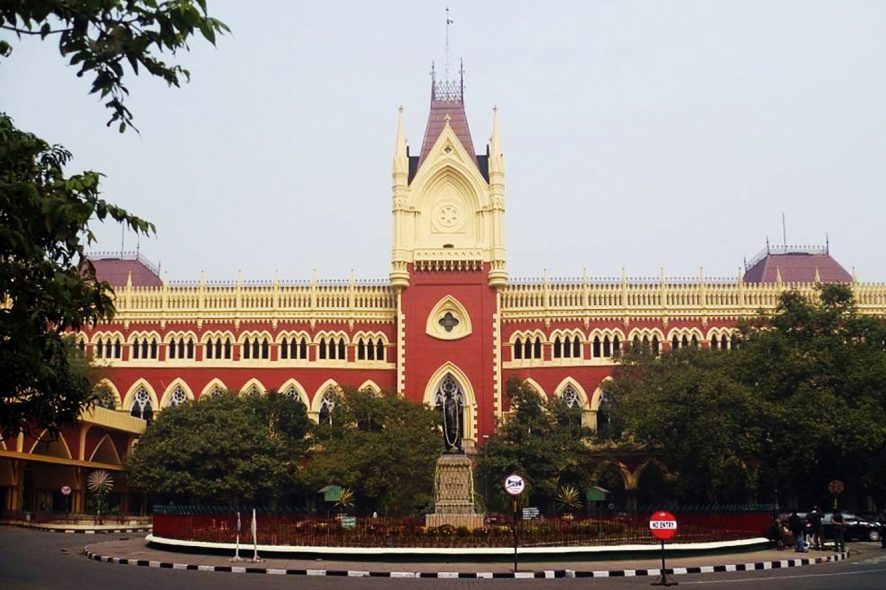Calcutta High Court: The Division Bench of Soumen Sen and Rabindranath Samanta, JJ., dismissed a criminal appeal which was filed against the judgment and order of conviction and sentence passed by Additional Sessions Judge–cum-Special Judge under POCSO Act, 2012 whereby the appellant had been convicted for commission of offence punishable under Section 6 of the Protection of Children from Sexual Offences Act, 2012 read with Section 376 (2) (i), Indian Penal Code and sentenced to suffer rigorous imprisonment for life without remission and to pay a fine of Rs. 2,000,00.
On 15th December, 2017 victim minor girl was raped by the appellant/accused as confessed by him to the mother of the victim at the time of confrontation and soon after that he fled away from his room. Thereafter, FIR was lodged under Section 6 of the POCSO Act. After completion of the investigation, the investigating officer submitted charge-sheet under Section 6 of the POCSO Act against the accused. Trial Judge found the accused guilty of committing the offence and charges framed against him being proved convicted and sentenced him as above. Feeling aggrieved by which the instant appeal was filed.
Counsel for the appellant argued that the prosecution had failed to establish the foundational facts and the charges levelled against the accused person, he further argued that the evidence of the prosecutrix cannot always be presumed to be gospel truth to record conviction of an accused. On the contrary, Counsel for the State submitted that the ocular evidence conjointly with the medical evidence clearly established without any shadow of doubt that the accused person sexually ravished the victim girl. He further submittd that the vital prosecution witnesses remain unshaken in cross-examination and their testimony before the Court was in consonance with the statements made by them before the Magistrate. In the judgment also the Trial Judge had held that the prosecution had been able to prove the foundational facts of the case and the legal presumption under Section 29 of the POCSO Act was available against the accused person. This implies that the onus was shifted upon the accused person to show why such presumption could not be available against him. But the accused person failed to discharge such onus either from the evidence led by the prosecution or by adducing independent evidence.
The major issues were with regard to evidence of a child witness and the concept of reverse burden of proof in a criminal trial. The Court in this regard explained that,
A witness is someone who provides astute evidence, which is proof that they have personally heard, seen, smelt, or felt. Competence is sometimes misconstrued with credibility or dependability. Determining competency is not a test of whether or not the witness is giving, or will give, accurate or truthful testimony. Credibility and reliability are factors that the trier of fact considers when deciding how much weight to give the evidence (judge or jury depending upon where the case is being heard). If the child is called as a witness by the prosecution, he or she must have the ability to understand the questions put to him by the defence as well as the prosecution and to provide answers to them which are understandable.
The Court further elaborated the role of child witness in criminal trials according to the Indian Legal Jurisprudence and quoted that the basic test of competence is whether the person is able to understand questions put to him as a witness, and give answers to them which can be understood.
The Court mentioned catena of decisions that with respect to children, no precise age is fixed by law within which they are absolutely excluded from giving evidence on the presumption that they have not sufficient understanding including Panchhi and National Commission for Women v. State of Uttar Pradesh, 1998 CriLJ 3305, Yogesh Singh v. Mahabeer Singh, (2017) SCC 195, The State of Maharashtra v. Bandu, 2018 (11) SCC 163, Sakshi v Union of India, (2004) 5 SCC 518 etc.
The Court was finally of the view that the prosecution has provided and substantiated foundational evidence and has proved its case beyond all reasonable doubt. The appellant/accused neither examined any independent witness nor produced any contra evidence to prove his defence. There has been no discrepancy between the place of occurrence, medical witness, report, and oral evidence of the alleged eye witness. The appeal was accordingly dismissed and order of conviction and sentence under appeal was confirmed.[Raju Roy v. State of West Bengal, 2021 SCC OnLine Cal 2911, decided on 29-09-2021]
Suchita Shukla, Editorial Assistant has reported this brief.
For the Appellant : Md. Zohaib Rauf, Mr Rameez Alam
For the State of West Bengal : Mr Saibal Bapuli, Mr. Bibaswan Bhattacharya







